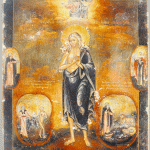
Ascetic Christian spirituality is based upon the recognition that we are all in need of spiritual medicine. We are all sinners who have done various things which we are sorry that we have done, things which often influence us and cause us to act contrary to the way we wish we would act because. This is because, every time we act, our action will seed its influence in our will, often creating and forming habits which are difficult to overcome. Ascetic Christian spirituality wants us to have a realistic understanding of ourselves and our failings. It wants us to recognize that we have sinned, that we are spiritually wounded. But it also wants us to do what we can to confront and overturn the harm which we have caused for ourselves and for others, realizing, however, we cannot do it alone; we need help, we need proper spiritual medicine, that is grace, to become fully healed. It doesn’t matter what kind of sins we are talking about. Lists of sins, ranking them, trying to determine which is greater than others can be useful, in the right circumstance, but they can also be detrimental, if we use them to prop ourselves up, to ignore that we are in need of grace, acting like what we do is of little to no consequence because the sin which we do is not considered grave. We should not compare ourselves to others, trying to find a way to see how we are better than others. Doing so only distracts us from our own spiritual needs.
What we need to do is focus on our own sins, to focus on our own spiritual weakness. One way the ascetic tradition suggests we do this is to consider ourselves to be the first among sinners so that we not only recognize our own need for spiritual grace, we stop looking to others to judge them, thinking they are beneath us and worthy of our contempt. Nonetheless, we must be careful when we think of ourselves in this fashion; becoming aware of our sins and our need for grace should not lead us to hate ourselves. We must not judge ourselves so harshly that we fail to recognize the good which is within us. While we are sinners, we are, by nature, good; no matter what we have done, there will always be some good in us, something in us to love, something worth saving. God loves us and so we should also love ourselves (for if God loves us, who are we to think differently)?
Acknowledging our sins should not lead us to despair. It should be about humility. We should recognize who and what we are, the good and the bad. If we do not do this, we will either suffer from great pride, causing us act unloving towards others, or we will hate ourselves, and so not allow ourselves to receive the love and grace which we need. Thus, we should not let our humility be abused, turning it into an excuse to hate ourselves and ignore all the good which we have inside of us, the good which God continues to love. We must engage a delicate balance, a path between two extremes, both of which are dangerous, because both lead to the rejection of love, either for others as we push them down thanks to our pride, or ourselves, as we push ourselves down and think there is no good in us to love.
We should care about everyone. We should always put that love front and center in our spiritual activity. This love should be for others, but also for ourselves. Not only should take care of others and their needs as we can, but we should take care of our own needs as well. When we don’t, we will be cutting ourselves off from the spiritual medicine we need. This was one of the things which Abba Poemen learned and used to direct those under his own spiritual direction, the need to engage love in both dimensions, so that when they welcomed others with such love, they continued to pursue their own needs and relay them to God as well:
Abba Poemen said, ‘I will tell you why we have so much difficulty; it is because we do not care about our brethren whom Scripture tells us to receive. Moreover we do not remember the woman of Canaan (cf. Matt. 15:22) who followed the Lord crying and begging for her daughter to be cured, and the Lord heard her and gave her peace.’ [1]
Abba Poemen said that the more we know, the more we realize what we should be doing, the more we understand the love which we should have for others, the more we have a responsibility to act upon it, to put it in practice so that through such practice, we not only help others by our acts of love, we also teach them the way of love by our example:
He also said, ‘If a man understands something and does not practise it, how can he teach it to his neighbour?’ [2]
So long as we do not act upon what we know and understand love tells us to do, we should not be surprised that others won’t act upon the dictates of love either. We must lead by example, showing the good which can be accomplished by such love. If we don’t, then we should not be surprised if our neighbor sees and learns a different lesson from us. The more we pursue the way of love, the more we can and will teach our neighbor what they need to learn, the more they will respond in kind and grow in love themselves; the more we abandon the way of love, ignoring our neighbor and the love which they need, the more they will respond in kind. Thus, it can be said, hate produces more hate, just as love produces more love.
We should not merely be pursuing our own wants and interests, justifying ourselves by saying how much better we think we are than others. We should remember we are sinners, spiritually sick and so in need of help. We won’t get well all by ourselves, but that is what happens when we try to justify ourselves before God, acting lime we are better than we are. The more we act with such arrogance, ignoring our own true spiritual condition, the more our sickness will spread, and the worse we will become, because we will have denied the grace, the spiritual medicine which we need to get better. “Abba Poemen said this about the son of Shemai, ‘His mistake was to justify himself; whoever does that destroys himself.”’[3] While we must not seek to justify ourselves, acting as if we have no need for grace, we must not hate ourselves, either. We must love, and love everyone with our love. We must engage the world with such love, acting upon the dictates of love and not just talk about them. This includes being willing to love ourselves, so long as we do so in the same way we love everyone else, and not in a selfish fashion, trying to prop ourselves up over everyone else. This means, moreover, we should be willing to accept the love of others, for if we do not, then others will not learn to accept our love and what we can and have to offer them. We must avoid the two extremes of loving others and hating ourselves, and hating others so as to exclusively love ourselves, for in either occasion, our spiritual sickness will remain. Humility, true humility, allows us to see our needs, so we don’t seek to justify ourselves, as well as recognize why, despite our need, we still are to be loved, and so do not end up in despair, thinking there is nothing good left in us. We must acknowledge our sins, but we must also acknowledge the good in us as well. Since so many of us do not realize we are in need, ascetic spirituality begins with the recognition of our failings, our faults, and so our need; but it does not end there, for that will lead to abuse. It must always be connected with humility and the willingness to accept that there is still good in us, a good which can be loved, a good which is indeed worthy of being loved. Then we can accept not only that we are in need, but we can ask for our needs to be met, and so truly begin to be healed.
[1] The Sayings of the Desert Fathers. trans. Benedicta Ward (Kalamazoo, MI: Cistercian Publications, 1984), 195 [Sayings of Abba Poemen 204].
[2] The Sayings of the Desert Fathers. 194 [Sayings of Abba Poemen 197].
[3] The Sayings of the Desert Fathers, 195 [Sayings of Abba Poemen 207].
Stay in touch! Like A Little Bit of Nothing on Facebook.
If you liked what you read, please consider sharing it with your friends and family!













